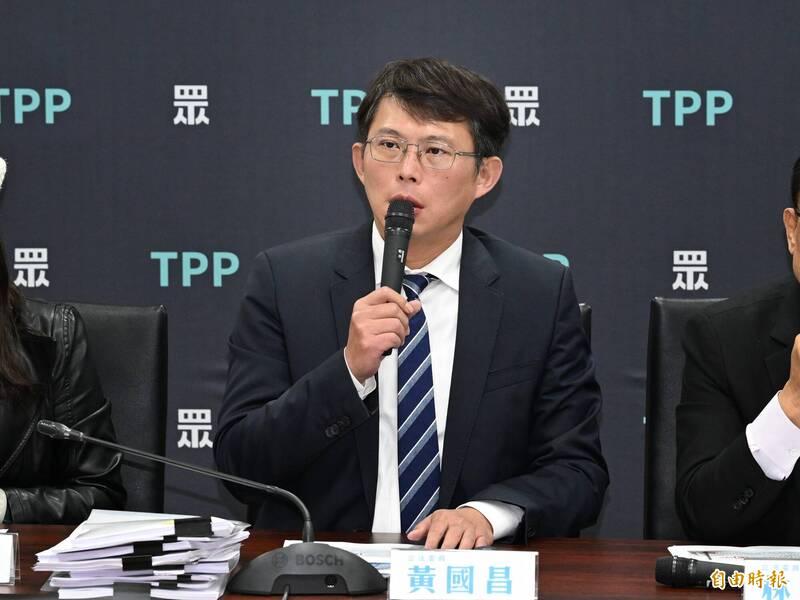Acting Taiwan People’s Party (TPP) Chairman Huang Kuo-chang (黃國昌) today announced he would run for party chair with the election set to be held next month.
Former party chairman Ko Wen-je (柯文哲) resigned earlier this month, as he is still being held in detention as part of an ongoing investigation into the Core Pacific City redevelopment corruption case.

Photo: Chen Yi-kuan, Taipei Times
Huang announced his candidacy on Facebook this morning, saying his goal is to “strengthen Taiwan’s third force,” referring to the party.
“Taiwan’s third force is a hard-earned flame that is vital for future democratic development and must not be extinguished,” he said.
The party needs to focus on three goals, Huang said.
First, it needs to find more leaders to guide society toward steady progress in next year’s local elections, he said.
Second, it must maintain its responsibility to curb the expansion of government power and speak up for the people, he said.
“Taiwan belongs to the Taiwanese people, not to the Democratic Progressive Party,” he said.
Third, it must carry the spark ignited by Ko, building the blueprint for Taiwan’s future development, he said.
While Ko is unable to lead the party, Huang would make every effort to move the party forward, bringing about reforms and progress that Taiwan needs, he said.
“Comrades, let us work together so that Ko will be proud of this party when he returns,” Huang said.
The election for party chair is to take place on Feb. 15 from 9am to 4pm through online voting, the party said.
Candidates must have joined the party before Feb. 14 last year and been a Central Committee member to qualify, according to party regulations.
The party’s top leaders have agreed to support Huang, people familiar with the matter said.
Huang has the unanimous support of the party and no one dares challenge him for the position, an anonymous party member said.
The only other eligible party member with sufficient backing is founding party member Tsai Pi-ju (蔡壁如).
During a political talk show yesterday, Tsai said she would not necessarily run and would only decide after discussing it with key party leaders.

Taiwanese can file complaints with the Tourism Administration to report travel agencies if their activities caused termination of a person’s citizenship, Mainland Affairs Council Minister Chiu Chui-cheng (邱垂正) said yesterday, after a podcaster highlighted a case in which a person’s citizenship was canceled for receiving a single-use Chinese passport to enter Russia. The council is aware of incidents in which people who signed up through Chinese travel agencies for tours of Russia were told they could obtain Russian visas and fast-track border clearance, Chiu told reporters on the sidelines of an event in Taipei. However, the travel agencies actually applied

New measures aimed at making Taiwan more attractive to foreign professionals came into effect this month, the National Development Council said yesterday. Among the changes, international students at Taiwanese universities would be able to work in Taiwan without a work permit in the two years after they graduate, explainer materials provided by the council said. In addition, foreign nationals who graduated from one of the world’s top 200 universities within the past five years can also apply for a two-year open work permit. Previously, those graduates would have needed to apply for a work permit using point-based criteria or have a Taiwanese company

The Shilin District Prosecutors’ Office yesterday indicted two Taiwanese and issued a wanted notice for Pete Liu (劉作虎), founder of Shenzhen-based smartphone manufacturer OnePlus Technology Co (萬普拉斯科技), for allegedly contravening the Act Governing Relations Between the People of the Taiwan Area and the Mainland Area (臺灣地區與大陸地區人民關係條例) by poaching 70 engineers in Taiwan. Liu allegedly traveled to Taiwan at the end of 2014 and met with a Taiwanese man surnamed Lin (林) to discuss establishing a mobile software research and development (R&D) team in Taiwan, prosecutors said. Without approval from the government, Lin, following Liu’s instructions, recruited more than 70 software

Chinese spouse and influencer Guan Guan’s (關關) residency permit has been revoked for repeatedly posting pro-China videos that threaten national security, the National Immigration Agency confirmed today. Guan Guan has said many controversial statements in her videos posted to Douyin (抖音), including “the red flag will soon be painted all over Taiwan” and “Taiwan is an inseparable part of China,” and expressing hope for expedited reunification. The agency last year received multiple reports alleging that Guan Guan had advocated for armed reunification. After verifying the reports, the agency last month issued a notice requiring her to appear and explain her actions. Guan